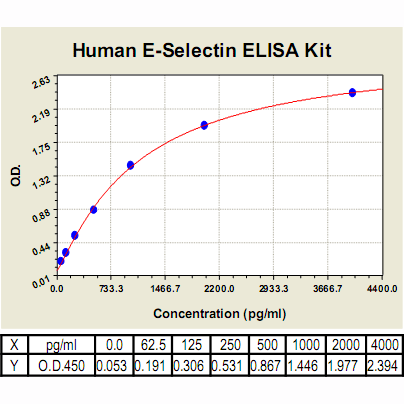E-Selectin ELISA Kit, Human
Human E-Selectin ELISA Kit: Human E-Selectin ELISA Kit
Size: 96 Wells
Price: $587.00
Description
E-selectin is an endothelial cell-specific membrane glycoprotein that mediates slow rolling and stable arrest of leukocytes on endothelium during inflammation. E-selectin binds two ligands, PSGL-1 and E-selectin ligand-1 (ESL-1).2 Some glycolipids can support E-selectin dependent rolling in vitro. Its function in mediating leukocyte rolling is largely redundant with that of P-selectin. E-selectin operates “downstream” from P-selectin, more toward the firm adhesion step of the cascade. E-selectin is not constitutively expressed in endothelial cells, but is transcriptionally induced by NF-κB and AP-1 in response to inflammatory cytokines such as IL-1beta and TNF-alpha. Consequently, elevated E-selectin expression was reported in many types of inflammatory diseases including diabetes, atherosclerosis, rheumatoid arthritis, and cancer. In addition to E-selectin-mediated inflammation, many studies have suggested a potential involvement of E-selectin in the attachment and transmigration of circulatory metastatic cancer cells through the endothelium.3 In addition, there is evidence that E-selectin may play a role in angiogenesis. It was shown that antibodies directed against E-selectin inhibited the formation of capillary-like tubes in vitro. It was reported that soluble E-selectin, which lacks the transmembrane and cytoplasmic domains, induces angiogenesis in the rat cornea and stimulates chemotaxis and tube formation of human dermal microvascular endothelial cells (HDMEC) through Src- and phosphatidylinositol 3-kinase-mediated pathways. E-selectin is closely associated with essential events of angiogenesis including endothelial cell proliferation, migration, and neovascularization.4
2. Varki, A. et al: Proc. Natl. Acad. Sci. USA 91:7390-7, 1994
3. Mann, A.P. et al: PloS ONE 5:e13050, 2010
4. Koch, A. E. et al: Nature 376:517-9, 2002
Details
| Cat.No.: | CL0501 |
| Target Protein Species: | Human |
| Range: | 62.5 pg/ml – 4000pg/ml |
| Specificity: | No detectable cross-reactivity with IGF-1 |
| Storage: | Store at 4°C. Use within 6 months. |
